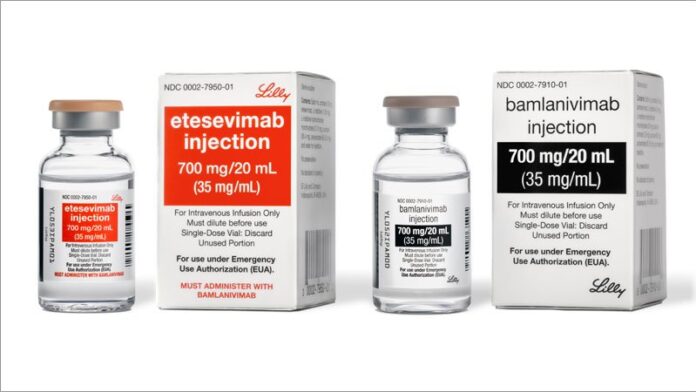[ad_1]
Find the latest COVID-19 news and guidance in Medscape’s Coronavirus Resource Center.
The US Food and Drug Administration (FDA) has granted emergency use authorization (EUA) to two monoclonal antibodies in combination for mild-to-moderate COVID-19 for people 12 years and older who test positive.
Bamlanivimab and etesevimab (both Eli Lilly) are authorized to treat people with elevated risk for severe disease, including adults over 65 and those with relevant comorbidities.
The EUA is based in part on the BLAZE-1 pre-clinical study of 1035 people with mild-to-moderate COVID-19 symptoms. A single infusion of the combined monoclonal antibodies significantly reduced hospitalization and all-cause death rates by about 70% compared with placebo during 29 days of follow-up.
A total of 11 (2%) of people treated with the combined therapy were hospitalized, compared with 36 (7%) in the placebo group. Ten participants died during the study, all in the placebo arm.
The therapy is not intended to treat people already hospitalized with COVID-19. The treatment has not been adequately studied in this patient population, the FDA noted in a news release. Furthermore, evidence suggests monoclonal antibodies can worsen clinical outcomes for people hospitalized for COVID-19 who require high-flow oxygen or mechanical ventilation.
“The data supporting this emergency authorization add to emerging evidence that points to the clinical utility of neutralizing antibodies for the treatment of COVID-19 in certain patients,” Patrizia Cavazzoni, MD, acting director of the FDA’s Center for Drug Evaluation and Research, said in the release. “As part of our Coronavirus Treatment Acceleration Program, the FDA uses every resource at our disposal to make treatments such as these monoclonal antibodies available while continuing to study their safety and effectiveness.”
This EUA announcement February 9 gives clinicians additional monoclonal antibody treatment options. Bamlanivimab received emergency authorization as monotherapy in November, as did another combination of monoclonal antibodies from Regeneron, casirivimab and imdevimab.
Bamlanivimab and etesevimab each target different components of the SARS-CoV-2 spike protein. They are designed to block the ability of the virus to attach and enter human cells. The therapy should be administered as soon as possible following a positive COVID-19 test, and within 10 days of symptom onset, according to a Lilly news release.
The EUA comes with a fact sheet from the FDA that outlines dosing instructions, potential side effects, and drug interactions. Possible side effects of bamlanivimab and etesevimab administered together include nausea, dizziness, pruritus, and rash.
The agency cautioned that serious and unexpected adverse events including hypersensitivity, anaphylaxis, and infusion-related reactions have been observed with bamlanivimab with and without coadministration of etesevimab. Furthermore, clinical worsening following bamlanivimab administration has been reported, although it is not known if these events were related to bamlanivimab use or were a result of progression of COVID-19.
The FDA emphasized that an EUA is not the same as a full review and approval, but that the agency acted because the current evidence supporting benefits outweighs risks. The research evaluating the safety and efficacy of this therapy is ongoing.
Damian McNamara is a staff journalist based in Miami. He covers a wide range of medical specialties, including infectious diseases, gastroenterology and critical care. Follow Damian on Twitter: @MedReporter.
[ad_2]
Source link












